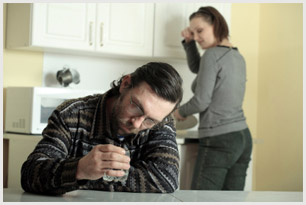Coping with a partner’s drinking
 Guidelines for a person whose spouse, partner, girlfriend, or boyfriend is using alcohol in a way that is causing problems – or in a risky way, likely to cause future problems.
Guidelines for a person whose spouse, partner, girlfriend, or boyfriend is using alcohol in a way that is causing problems – or in a risky way, likely to cause future problems.
Powerlessness and Power
The word Powerlessness comes from Al Anon (the support group for families of a person dependent on alcohol). You do not have the power to do something or to say something that is guaranteed to make the other person stop using alcohol. This is important, because you can spend many sleepless nights wondering “What can I do to make the person change?”
However, you do have power over your own life. Research has found that the stress (or distress) of the family can be reduced by the other family members not focusing on trying to change the person with the addiction, and focusing instead on getting on with their own lives (Al Anon uses the phrase “Detach with love” for this, and the research which came to similar conclusions was carried out by Richard Velleman in U.K., independently of Al Anon).
Getting support for yourself is a good idea. Resources include Family Support, self-help groups such as Al Anon, counselling services, community-based services, parish groups, IBDI (Irish Bishops’ Drugs Initiative), Community Addiction Teams, your local or regional Drugs Task Force, etc.
Inform yourself from books or websites, so that you have a better understanding of alcohol-related problems and dependence.
Children and Resilience
If there are children in the family, they can be helped too. We use the word “resilience” to describe the strengths that help children to do well despite the disruption caused by a person misusing alcohol. Research has found that there ARE things that the family can do to help children to develop resilience.
Children are found to be more resilient in families where the misuse of drink takes place away from the home, not in the home.
Similarly, if rows and fights occur, the children are more resilient if the rows take place not in front of the children (and not where they can overhear the rows either).
Children are more resilient in families where certain routines are kept, like regular family meals (daily or weekly) and where occasions like birthdays are celebrated.
Children are helped to be more resilient by having an older person outside the family whom they can talk to, like a grandparent or a school teacher or an aunt/uncle or a friend. So keeping the whole problem as a secret is not helpful.
Finally, if the parent who does not have the dependence (addiction) is able to converse with the young people, explaining the dependence in language the children can understand, this will help. The aim will be to help the children too to “detach with love”, getting on with their own lives as best they can.
Intervention
There are times when it is possible to carry out an “Intervention” meeting in an effort to bring the person with the alcohol problem into greater awareness of this reality. In terms of the Wheel of Change, the aim of Intervention is to prompt the drinker to move through the stages on the Wheel of Change, from Pre-contemplation to Contemplation, Preparation, Action and Maintenance (as appropriate).
Some Treatment Centres for addiction will have Preparation Programmes to help a family to prepare for an intervention.
Very briefly, the process of an Intervention involves the following:
-
The family members who are going to be involved meet and make preparation for the intervention. This preparation includes:
- Deciding who will take part and when
- Clarifying what are the facts that will be mentioned
- Clarifying what are the desired outcomes of the meeting
- Clarifying what choices are open to the family members
- The intervention meeting will be arranged for a time when the person with the alcohol problem is likely to be sober and drug-free.
- At the meeting, those present express that they are doing this out of care, love and concern and not out of anger or a desire to punish.
- Those present in turn point out what they have observed that is causing them to be concerned. This is where the preparation is important. They should stick to facts. For example, the person drank 5 cans of lager and fell through a glass door. These are facts. Words like drunk, disrespectful, alcoholic are not helpful at this stage, because they are not factual. They can be disputed. It is much better to stick to indisputable, observable facts.
- Those present then outline what options are open to the person with the problem. For example, he or she could go for an assessment to a doctor or a treatment centre. They could go to an AA meeting. They could make no change, and carry on as before. They could get worse, using more of the substance and getting into deeper problems.
-
Those present finally outline what options are open to them. For instance, if the person gets help for the problem, the family will be supportive. If the person stays the same as before or if they get worse, the family will take appropriate action. Those present should be clear and specific as to what action they will take (and this is where good preparation and consultation is important).















